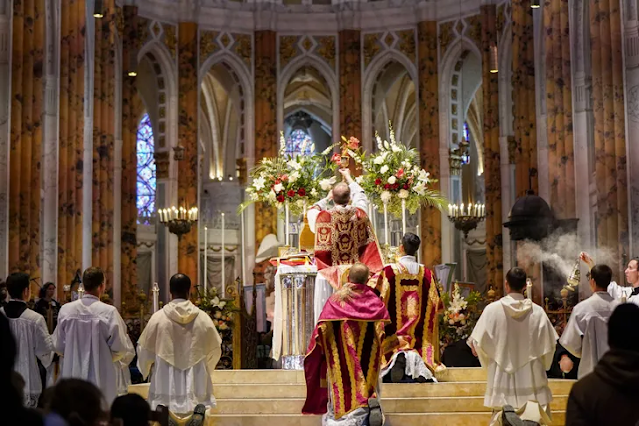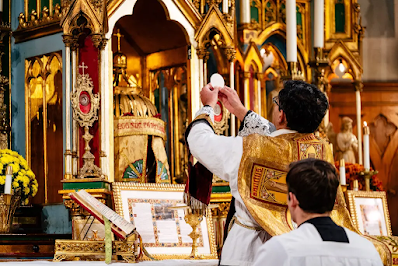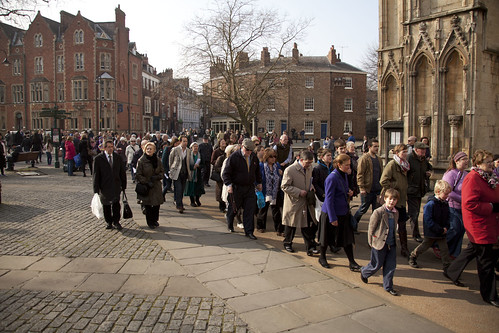a guest-post by Peter Kwasniewski PhD
 |
Tradition means handing on something to someone
(Traditio of the keys to St. Peter - 12th Cent. manuscript, France) |
It is sometimes asserted that traditional Catholicism is bound up with a prideful attitude—that it is impossible to profess traditionalism without being pharisaical. Some even object to the phrase “traditional Catholic,” as if it were redundant: Aren’t Catholics by definition adherents of Catholic tradition—and thus, any Roman Catholic has as much right to be called “traditional” as he has to be called “Roman”?
How nice it would be if this were true, but alas, it is far from being the case.
First, the psychology of the issue. There is a danger of pride or pharisaism in any possible true description of oneself: Christian, Catholic, Roman Catholic, traditionalist. To say “I am a Christian” is a genuine boast for St. Paul and for every martyr who has died for Jesus Christ, including the God-fearing victims of Islamic extremism in Syria and elsewhere. Are we to say that because someone might revel too much in the title of Christian and think himself better than his unbelieving neighbor, the very title ought to be abolished? One might just as well avoid baptism, which, thanks to no merits of our own, truly makes us better than we were before, and far better off than any unbeliever.
 |
Tradition of goods and assets: a concept well established in Roman Law.
"Traditio nihil amplius transferre debet vel potest ad eum qui accipit,
quam est apud eum qui tradit." (Corpus Iuris Civilis, Dig., XLI)
(Justinian, Basilica of San Vitale, Ravenna) |
Or, to take up the charge of redundancy: “Catholic Christian” may seem like a triple redundancy, yet it is useful precisely because there are Protestant and Eastern Orthodox Christians.
“Traditional Catholic,” likewise, is no redundancy, because there are so many Catholics who are, intentionally or not, modernists in their thinking and their practices. In an ideal world, the Christian ought to be the Catholic, just as the Catholic ought to be traditional; but even as not every Christian is Catholic, not every Catholic is traditional in a meaningful sense of the word.
Pursuing this point, we would be deceiving ourselves if we did not recognize that it is quite possible today—in a startling and unprecedented way—for Catholics not to be traditional, not to be thinking and living in accordance with major elements of their 2,000-year tradition, such as asceticism, liturgical praxis, and adherence to orthodox doctrine. For the first time, we have seen the widespread acceptance of an interpretation of Catholicism that is anti-traditional, that considers itself free from tradition, free to reshape itself according to indeterminable “modern needs.” Apropos the concept of aggiornamento, Karl Barth apparently asked the Catholic Church this uncomfortable question in 1966: “When will you know if the Church is sufficiently updated?” This is the Achilles’ heel of every Weigel-style critique of traditional Catholicism: just like Bugnini in his liturgical reform, Weigel has to pick and choose what’s worth keeping and what ought to be discarded in his evangelical re-envisioning of the Church, as if he were standing outside of tradition, history, and papal teaching, standing over it rather than submitting to be formed, measured, and judged by all of it.
If there are dangers of pride in any state or way of life, there is no less a danger of being proud of one’s very open-mindedness, one’s freedom from ideology, one’s immunity to the error of judgmentalism, one’s superbly balanced apprehension of reality. One can be a Pharisee of open-mindedness, an ideologue of dialogue, a dogmatist about refusing to dogmatize. One can be simplistic by seeing everyone who takes a strong line as a simpleton.
The only one who can escape pride, judgmentalism, and ideology is the one who completely submits his mind to an objective external standard, one who submits his heart to another whom he loves without qualification. The traditional Catholic is one who says: There is such a standard, and it is Divine Revelation, communicated to us in Scripture and Tradition and guarded by the perennial Magisterium. He is one who says: There is such a beloved, our Lord Jesus Christ, to whom absolutely everything—all human actions and sufferings, all arts and sciences, all cultures and governments, cities and nations—must be intentionally and explicitly ordered if they are to achieve their God-given purpose. And when they are not so ordered, they are doomed, over time, to feebleness, perversion, anarchy, and suicide. The traditionalist can maintain these positions humbly because they are true, and it is the truth that sets us free from all sin, including the sin of pride.
 |
Traditio means delivering something to someone
(St. Peter holding keys delivers Epistle to St. Silas from his Chair -
cf. I Pt 5:12 - 14th Cent. Bible, France) |
The traditionalist desires to receive humbly what the Lord has given us, to open wide his heart to his blessed inheritance that is always so much greater than his own limited mind can comprehend, much less improve upon. The pridefulness of the modern(ist) Catholic consists in thinking himself superior to his Catholic inheritance—in a position, one might say, of “self-absorbed promethean neopelagian” creativity towards what has been devotedly handed down, century upon century. The judgmentalism of the modern Catholic can be seen in his dismissive attitude towards traditions and the traditionalist who loves them, whom he refuses to see as a lover of the full breadth and depth of Christ and of His Church, and whom he finds it easy to caricature as narrow-minded, rigid, joyless Pelagian, et cetera.
I am reminded in this connection of some pointed remarks by Cardinal Siri, published in the
Rivista Diocesana Genovese in January 1975 (courtesy of
Rorate):
Slogans abound, while catechism is not taught; “pastoral” is continually mentioned, while sacred ministries are gradually abandoned; there is talk of the Word of God—yet it is taught as if it were all a fairy tale. There are dissertations about closeness with God, while at the same time the Most Blessed Eucharist is mocked or ridiculed. At least in practice. And all of this is progress!
One might have thought, in recent years, that Catholics were at last beginning to escape the shadowlands of the seventies, leaving its pomps and works far behind. Alas, in the Church today we are seeing a renewed effort on the part of some to promote the same old postconciliar “progress” lamented by Cardinal Siri. We are being given as our “pastoral model” a modus operandi that originated in the secularizing confusion of the years immediately following the Council—a modus operandi that badly failed back then and will, by God’s justice, fail again and again, since it is anti-traditional in content, method, and goals.
Indeed, something worse has come upon us: a return to the open denigration, marginalization, and persecution of traditionalists. It is as if, in the wake of the Emancipation Proclamation, there were a new regime intent on reintroducing slavery or, at best, arranging strict segregation and second-class citizenship. In the realistic words of Don Ariel Levi di Gualdo:
We did have the Second Vatican Council, but, in practice, during the following years, we returned to the period that preceded the Council of Trent, with its corruption and alarming internal struggles for power. After abundant discourses ad nauseam about dialogue, collegiality—for nearly half a century now—new forms of clericalism and authoritarianism have emerged. The progressive champions of dialogue and collegiality use aggression and coercion against anyone who thinks outside of the “religiously correct.” (Don Ariel, cited at Rorate)
To return to our point of departure: in normal circumstances, “Catholic” should be equivalent with “traditional.” Today, it decisively does not mean that; indeed, with the infiltration of modernism into the highest echelons of the Church, it cannot mean that, for some individuals. And yet, since to be a Catholic is—and must always be—to adhere to the Tradition handed down to us from the saints and to honor and preserve Catholic traditions, it follows that an explicit or implicit adherence to Tradition is, in fact, necessary for salvation, whereas hating or despising Tradition is a sign of one’s intention to depart from the Church of Christ, as a result placing one’s soul in jeopardy. There is far more resting on this matter than a particular person’s preference or inclinations: the very salvation of souls is at stake. The joy of the Gospel is bound up with knowing the truth, confessing it in season and out of season, and clinging to it with the determination of love. May God preserve us from the false joys of this world and all of the new Gospels that clamor for acceptance.
[Images and captions chosen by NC for the Feast of the Chair of Saint Peter.]















